SAN FRANCISCO — Vixen Media Group owner Strike 3 Holdings this week responded to Facebook parent company Meta’s motion to dismiss Strike 3’s suit accusing Meta of pirating VMG content to train its artificial intelligence models.
As XBIZ reported in July, Strike 3 alleged in its complaint to the U.S. District Court for the Northern District of California that Meta intentionally infringed on its copyrights by downloading VMG-owned content from pirate sources in order to train various Meta AI models. The suit specifically mentions BitTorrent as the source from which Meta allegedly acquired pirated copies of copyrighted VMG works.
In October, Meta filed a motion to dismiss the case, arguing that the timing and number of the downloads cited by Strike 3 “point solely to personal use, not AI training.”
“Meta contractors, visitors, or employees may have used Meta’s internet access over the years to download videos for personal use,” Meta’s motion contends, claiming that the number of downloads “is plainly indicative of private personal use, not a concerted effort to collect the massive datasets Plaintiffs allege are necessary for effective AI training.”
Meta also dismissed Strike 3’s claims attributing numerous downloads made from non-Meta IP addresses to Meta as well.
This week, Strike 3 filed its response with the court, asserting that “Meta’s excuse that employees must be infringing Plaintiffs’ copyrights for ‘personal use’ does not fit the facts.”
Instead, Strike 3 counters, the “unique patterns of Meta’s piracy” suggest “a centralized algorithm coordinating the infringements.”
“The downloads do not behave like a human who may search for files on a subject,” Strike 3 argues, suggesting instead that the patterns “not only indicate the use of a universal ‘script’ (likely developed, supplied, or encouraged by Meta), but also show that the BitTorrent downloads are ‘for AI training data and not for personal use.’”
Strike 3 also cites Kadrey v. Meta Platforms, Inc., another recent copyright infringement suit in which Meta “admitted to using BitTorrent to obtain digital copies” of books for AI training, and alleges that the IP addresses in that case match those used to download VMG content. Additionally, Strike 3 asserts that Meta acknowledged in that case that it masked its corporate IPs to prevent detection of its BitTorrent activity.
“Plaintiffs were able to correlate Meta’s infringement through its Corporate IPs to six hidden data centers that were used to engage in massive infringement of both Plaintiffs’ and the Kadrey plaintiffs’ works as well,” Strike 3 states. “The scale of these infringements is staggering and are ‘beyond what a human could consume.’ And the activity from those same Off-Infra IPs was similar to activity Plaintiffs recorded from Meta’s Corporate IPs, showing they all acted in concert to the same ends. Those ends, as revealed in Kadrey, were to train Meta’s AI and not for the personal use of its employees. Thus, like the books in Kadrey, it is reasonable to infer that Meta pirated Plaintiffs’ works to train its AI.”
As XBIZ has reported, Strike 3 has for years pursued a strategy of filing infringement lawsuits in federal court against unauthorized downloaders of its content. The suit against Meta, however, dwarfs those cases in scale.
Pursuant to U.S. copyright law, Strike 3 and subsidiary Counterlife Media are seeking statutory damages per infringed work. Due to the high volume of alleged violations — the suit claims infringement on at least 2,396 movies — those damages could amount to $359.4 million, assuming the court awards statutory damages of the maximum $150,000 per infringed work.
In addition, the suit also involves the adult industry in the current wave of litigation around the use of copyrighted materials to train AI, as jurisprudence continues to evolve around what constitutes “fair use” in the age of AI.








